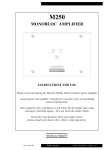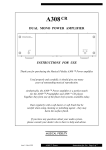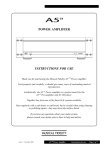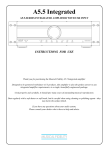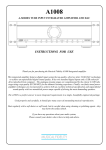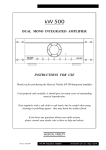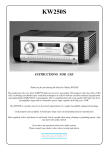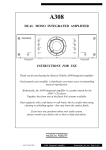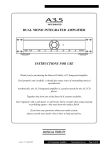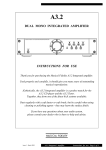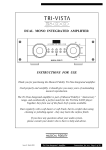Download Musical Fidelity A5 Specifications
Transcript
XX DUAL MONO INTEGRATED AMPLIFIER INSTRUCTIONS FOR USE Thank you for purchasing the Musical Fidelity A5 Integrated amplifier. Used properly and carefully, it should give many years of outstanding musical reproduction. Aesthetically, the A5 Integrated amplifier is a perfect match for the A5 CD player. Together they form one of the finest hi-fi systems available. Dust regularly with a soft duster or soft brush, but be careful when using cleaning or polishing agents - they may harm the surface finish. If you have any questions about your audio system, please consult your dealer who is there to help and advise. Issue 1 : July 2004 A5 Integrated Amplifier Instructions for use Page 1 of 9 SAFETY INFORMATION IMPORTANT! (U.K. only) This unit is supplied in the U.K. with a mains lead fitted with a moulded 13 amp plug. If, for any reason, you need to cut off the plug, please remove the fuse holder and dispose of the plug safely, out of reach of children. It must not be plugged into a mains outlet. The wires in the mains lead supplied with this appliance are coloured in accordance with the following code: Green and yellow..............Earth Blue................................Neutral Brown.................................Live WARNING - This appliance must be earthed As the colours of the wires of the mains lead of this appliance may not correspond with the coloured markings identifying the terminals in your plug, proceed as follows: The wire which is coloured green-and-yellow must be connected to the terminal in the plug which is marked with the letter E or coloured green or green-and-yellow, or by the earth symbol: The wire which is coloured brown must be connected to the terminal which is marked with the letter L or coloured red. The wire which is coloured blue must be connected to the terminal which is marked with the letter N or coloured black. If connecting to a BS1363 plug, a 13 amp fuse must be used. WARNING: The A5 is a powerful amplifier and must necessarily supply high voltages through the loudspeaker terminals. Therefore, to avoid any possibility of an electric shock DO NOT TOUCH THE SPEAKER TERMINALS when the unit is being used. To comply with BSEN60065 safety regulations, the 4mm “banana” plug holes have been fitted with plastic blanking pieces. Removal of these will invalidate any electrical safety approval of this product. WARNING: Any modifications to this product not expressly approved by Musical Fidelity who is the party responsible for standards compliance could void the user’s authority to operate this equipment. Issue 1 : July 2004 A5 Integrated Amplifier Instructions for use Page 2 of 9 GENERAL ADVICE INSTALLATION PRECAUTIONS and USER INFORMATION Your new A5 Integrated is designed and built to provide trouble-free performance, but as with all electronic devices it is necessary to observe a few precautions: Heed all warnings shown on the back of the product. Only connect the A5 Integrated to a mains outlet having the same voltage as marked at the back of the unit. Always ensure that when disconnecting and reconnecting your audio equipment the mains supply is switched off. Position the mains lead and signal interconnects where they are not likely to be walked on or trapped by items placed on them. Do not use near water, or place water-filled containers on the amplifier, for example, a flower vase or potted plants. If water does spill inside, immediately pull out the mains plug from the wall socket and inform your dealer, who should then check the unit before further use. Entry of liquid into the amplifier is dangerous, and may cause electric shock or fire hazard. Do not place the unit near direct heat sources such as radiators, direct sunlight or other equipment. Do not remove any covers or try to gain access to the inside. There are no internal adjustments or fuses you can replace yourself. Refer all service work to an authorised Musical Fidelity agent. Note: Unauthorised opening of the equipment will invalidate any warranty claim. Dust regularly with a soft cloth or soft brush but be careful when using cleaning or polishing agents - they may harm the surface finish. The electronics in modern hi-fi equipment is complex and may, therefore, be adversely affected or damaged by lightning. For protection of your audio system during electrical storms, remove the mains plugs and disconnect any aerial lead. If after-sales service is required, to help your dealer identify the A5 Integrated amplifier please quote the serial number located on the rear panel of the unit. RADIO FREQUENCY INTERFERENCE (R.F.I) This product has been tested to ensure that its operation is not adversely affected by normal background levels of R.F.I., and that it does not itself generate excessive amounts of interference. However, if a problem persists, please contact your Musical Fidelity agent. Issue 1 : July 2004 A5 Integrated Amplifier Instructions for use Page 3 of 9 CONNECTIONS and FACILITIES 7 1 2 3 4 5 6 10 8 9 11 12 FRONT PANEL 1 2 3 4 5 6 7 Power on indicator LED POWER mains on/off switch Mute indicator LED Tape MONITOR button and LED PHONO input select button and LED CD input select button and LED Volume control 8 9 10 11 Super Audio CD input select button and LED TUNER input select button and LED Infra Red Receiver window for remote control Home Theatre DIRECT input select button and LED – see page 6 12 TAPE input select button and LED REAR PANEL 13 14 15 16 17 18 RIGHT SPEAKER output terminals Phono earth terminal PHONO input sockets CD input sockets Super Audio CD input sockets TUNER input sockets 13 14 Issue 1 : July 2004 15 19 20 21 22 23 Home Theatre DIRECT input sockets - page 6 TAPE input sockets TAPE RECord output sockets - see page 7 PRE-OUTput sockets – see page 6 LEFT SPEAKER output terminals IEC mains power inlet socket 16 17 18 19 A5 Integrated Amplifier 20 21 22 Instructions for use 23 Page 4 of 9 REMOTE CONTROL REMOTE CONTROL The blue buttons on the remote control enable main functions of the amplifier to be operated from a convenient distance. Remaining buttons on this universal handset are for use with other Musical Fidelity products, and have no effect on the A5 Integrated amplifier. Equivalent buttons on the remote handset have the same functions as those on the front panel of the unit. As the remote control uses an invisible infra-red light beam, the transmitter must be pointed directly towards the receiver window on the front of the amplifier, without visual obstruction between them. Pressing the volume-up or -down buttons on the remote handset will turn the motorised volume control in the required direction. Pressing the MUTE button disables the SPEAKER output and PRE-OUT sockets, but not does not affect TAPE RECord output. A red MUTE LED on the front panel lights to show that the amplifier is not producing power to the loudspeakers. Pressing the MUTE button again cancels mute function, and the red LED goes out. If the range of the remote control greatly decreases, replace the batteries with new ones. Do not mix old and new batteries - two are required, size LR03 or AAA, manganese alkaline type. Do not dispose of used batteries in a fire. (Amplifier function buttons only) CD input select TUNER input select PHONO pickup input select VOLUME (up) SACD input select Home Theatre DIRECT input select (see page 6) VOLUME (down) TAPE input select Issue 1 : July 2004 MUTE button A5 Integrated Amplifier Instructions for use Page 5 of 9 CONNECTIONS All input, output and power connections should be made with the mains power switched OFF. INPUT CONNECTIONS The A5 Integrated amplifier has a pair of RCA type phono input sockets intended for use with moving magnet (MM) pickups. Do not use for any other purpose. Some turntable/pickup arm combinations are fitted with an extra wire for chassis earthing. This should be connected to the earth terminal on the back panel. The A5 also has four stereo pairs of RCA “line level” input sockets controlled by the internal volume setting. They all have the same input sensitivity, and are therefore suitable for use with any source component having an output of at least 300mV. The four sockets on the rear panel are marked CD, SACD, TUNER, and TAPE, corresponding with function selector buttons on the front panel. The HT DIRECT sockets are intended for home theatre use. When selected, they are routed inside the A5 directly to the power amplifier circuit, which is not controlled by the volume adjustment. Do not therefore connect these sockets to a source without its own volume control. SPEAKER OUTPUT CONNECTIONS Connect your loudspeakers to the terminals on the back panel marked as LEFT and RIGHT SPEAKER outputs. PRE-AMPLIFIER OUTPUT The A5 Integrated amplifier has its preamplifier output available from RCA sockets on the back panel marked PREOUT, and is controlled by the volume adjustment. This is to allow “bi-amplification” using suitable external amplifiers and crossover networks to power the speaker drive components separately, giving noticeable improvement in clarity, imaging and bass weight. In this arrangement, typically the A5’s speaker outputs are used to drive the speaker’s “tweeter” (high audio frequencies), and an external stereo amplifier drives the “woofer” (low frequencies). The A5’s PRE OUT RCA sockets would therefore be connected to the input of the external “woofer” amplifier in this example. If you are in doubt about bi-amplification, please contact your dealer for advice. TAPE RECORDER CONNECTION The A5 Integrated has a single tape circuit with facilities for off-tape monitoring with 3-head tape decks (see page 7). The tape deck's left and right line outputs are routed to the amplifier's TAPE (input) sockets, and the tape deck's line inputs are connected to the amplifier’s TAPE RECord (output) sockets. BEFORE SWITCHING ON . . . . Plug the accessory IEC mains lead into the rear panel socket, then the other end into a wall outlet. Turn the volume control on the front panel to minimum (anticlockwise). Issue 1 : July 2004 A5 Integrated Amplifier Instructions for use Page 6 of 9 OPERATION STARTING . . . . OFF TAPE MONITORING Press the POWER button on the front panel of the A5 amplifier - the blue POWER LED above the button will light indicating that the unit is ready for use. However, for about five seconds no sound will be heard from your speakers, and the red MUTE LED near the button will not be lit, confirming initial mute action. In conjunction with a 3-head cassette deck, off-tape monitoring allows the user to compare recorded sound with the original whilst a recording is being made (see page 6 for connection details). To do this, first select the required source in the normal way and start recording. Unless using your amplifier for off-tape monitoring (see paragraph opposite ) ensure that the TAPE MONITOR button has not been pressed accidentally, as otherwise no sound will be heard through the speakers. The TAPE MONITOR button on the front panel can now be used to switch between the original source sound and the recorded version, allowing direct comparison. The blue LED just above the button is lit when the tape monitor function is operating, confirming that the recorded sound is selected. Select the required audio input source by pressing an appropriate function button on the front panel or remote control, and adjust the volume control to obtain the preferred sound level. On some 3-head tape decks there is an additional ‘tape/source’ switch, which must be in the ‘tape’ position for the above to work. TAPE RECORDING If in doubt, please refer to your tape deck operating manual. To record, simply select the required source with the input selector button on the front panel or remote control. This source will now be routed to the A5’s TAPE RECord output for recording by the external tape deck. You will also be able to hear the selected source through the loudspeakers. Note - adjustment of the volume control has no effect on the recording level. Issue 1 : July 2004 A5 Integrated Amplifier Instructions for use Page 7 of 9 PROBLEMS? Basic problem-solving with an amplifier is similar to troubleshooting other electrical or electronic equipment. Always check the most obvious possible causes first, such as the following examples: Problem Probable Cause Remedy No power when POWER button is pressed Mains power plug is not fully inserted into rear socket Plug in securely No sound Tape monitor function has been selected Switch off tape monitor Mute function is still active (mute LED is still on) Press the MUTE button on the remote control to cancel Wrong connections between input sources and the A5 Check audio input lead connections Speakers not connected, or incorrectly wired Check speaker cables Sound is not precise, lacking in Speakers are connected out of bass and stereo image phase, i.e., connections to one speaker (+ and -) are reversed Ensure speakers are connected correctly Hum Audio connector plug not fully pushed in Insert plug securely Remote control does not work Amplifier’s POWER switch is Set switch to on set to off One or more batteries fitted the Insert batteries correctly wrong way round Batteries are flat Change batteries – do not mix old and new ones Ensure there is no obstruction Remote control is not pointed directly towards the front panel between the remote control and amplifier front of the amplifier Remote control range has greatly reduced Batteries are running out Change batteries – do not mix old and new ones If none of these actions effect a cure, please contact your dealer, or an authorised Musical Fidelity service agent. Remember, never open the case of the A5 Integrated amplifier yourself, as this will invalidate the guarantee. Issue 1 : July 2004 A5 Integrated Amplifier Instructions for use Page 8 of 9 A5 Output : DUAL MONO INTEGRATED AMPLIFIER Power : SPECIFICATIONS 250 Watts per channel into 8 Ohms (24dBW), 400 Watts per channel into 4 Ohms 45 Volts 20Hz to 20kHz 127.3 Volts 75 Amps 140 4 50 Ohms Voltage, RMS : Voltage, Peak-to-peak : Current peak-to-peak Damping factor : Output devices per channel : Pre-out impedance : Line inputs : Total harmonic distortion + noise, 20Hz to 20kHz Signal / noise ratio Input sensitivity for 250 Watts into 8 Ohms Input impedance Overload margin Channel separation Frequency response < 0.01% > 100dB ‘A’-weighted 330mV 220k Ohms 26dB > 70dB typical 20Hz to 20kHz, +0, -0.2dB Home Theatre Direct input : Input sensitivity 30dB gain (31.5 times) nominal Phono input : Frequency response reference IEC RIAA - see graph . . . . 20.0 15.0 10.0 PHONO RESPONSE 5.0 dB 0.0 RIAA -5.0 PHONO -10.0 RIAA/IEC -15.0 -20.0 20.0 31.5 50.0 80.0 125 200 315 500 1000 1600 2500 4000 6300 10000 16000 Frequency (Hz) Signal / noise ratio > 96dB ‘A’-weighted Input sensitivity 2.5mV (moving magnet) Input impedance 47k Ohms Overload margin 24dB Inputs : 4 pairs line level RCA connectors, 1 pair (Home Theatre) direct power amplifier input RCA connectors 1 pair phono (moving magnet) RCA connectors Outputs : 2 amplifier channels via 1 pair per channel binding posts. 1 pair RCA audio outputs controlled by the volume, 1 pair RCA tape record fixed line level output. Power requirement : 100 / 115 / 230Volts AC 50 / 60Hz (factory pre-set), 700 Watts maximum into 8 Ohms, 35 Watts idle Weight : 16.6 kg, 19.1 kg, Dimensions : 440 mm, 17.3 inches wide 125 mm, 4.9 inches high including feet 400 mm, 15.75 inches deep including terminals Standard accessories : IEC type mains lead (10-Amp type), remote control (A5, universal type), 2 batteries size LR03 or AAA, manganese alkaline type Issue 1 : July 2004 36.6 lbs unit only, unboxed 42.1 lbs in shipping carton A5 Integrated Amplifier Instructions for use Page 9 of 9









